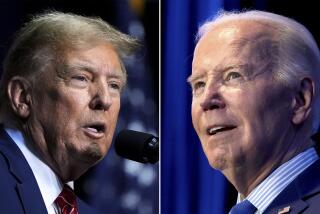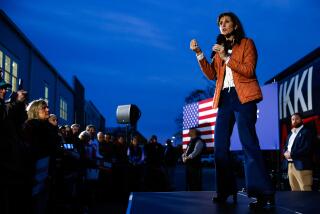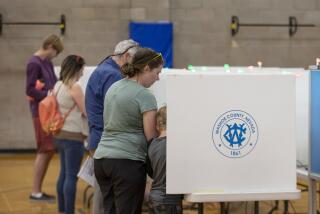Buchanan Edges Dole in N.H., Reshaping Republican Race
MANCHESTER, N.H. — Patrick J. Buchanan, self-proclaimed foe of the Republican establishment, won the New Hampshire primary Tuesday, suddenly reshaping the GOP presidential race into a contest between his conservative followers and the more traditional forces backing Sen. Bob Dole, who finished second, and Lamar Alexander, who came in third.
The victory of Buchanan--who has never held public office, and, indeed, had never won a primary before--over one of the party’s most respected elders would have seemed almost inconceivable as recently as two weeks ago. The event was the latest demonstration of the turbulence that has shaken American politics in both parties and that has vastly complicated the Republican effort to regain the White House.
With 98% of the vote counted, Buchanan had 27% to Dole’s 26%. Alexander received 23%. Steve Forbes, the millionaire publisher whose massively self-financed campaign began the process of upending Dole earlier this year, received only 12%.
However narrow his margin, Buchanan’s victory remained a remarkable achievement for an insurgent candidate with almost no backing from his party’s hierarchy. Clearly exhilarated by the prospect, he vowed to carry his cause forward.
“We’re going to give voice to the voiceless,” he said at a rally in Londonderry so crowded that fire marshalls turned away scores of supporters. “We’re going to reach out to the men and women of this country whose jobs have been sacrificed on the altars of trade deals done for the benefit of transnational corporations who have no loyalty to our country and no loyalty to anybody . . . we’re going to recapture the lost sovereignty of our country, we’re going to bring it home.
“We are taking back our party,” he said, as “a prelude to taking back our country. We do not apologize for the fact that we’re going to take control of our national destiny.”
And he warned his supporters to expect difficult battles ahead. “All the forces of the old order are going to rally against us,” he said. “Do not wait for orders from headquarters. Mount up everybody and ride to the sound of the guns.”
Getting a jump on his rivals, Buchanan then departed for the first leg of a barnstorming tour that is scheduled to take him today from South Carolina to Colorado to the Dakotas. “I’m going to Mt. Rushmore,” he said, as his crowd roared its approval. “There’s a spot up on that mountain I want to take a look at.”
As for Dole, the defeat was a bitter one. He only recently held a nearly unchallenged status as the front-runner in the Republican race, but he has now stumbled twice--barely beating Buchanan in Iowa last week, and now falling behind.
Nonetheless, the 72-year-old Kansan, who has unsuccessfully sought his party’s nomination twice before, could console himself with two thoughts. First, he retains important financial and organizational advantages over his rivals that will be particularly important in the crush of delegate contests immediately ahead.
Moreover, Dole was able to beat the man he had to beat--Alexander. Dole strategists are convinced, and polls agree, that the former Tennessee governor potentially has far broader appeal to primary voters than does Buchanan, who appeals primarily to the party’s most conservative faction and who is feared by many party leaders as a divisive and negative figure. For that reason, Dole concentrated nearly all his resources against Alexander in the last several days.
In a sometimes halting speech to his supporters here, Dole continued that strategy by trying to read Alexander right out of the campaign and declaring the contest to be “a two-man race.”
“It’s going to be a one-man race before long,” he added.
The battle from now on, he said, would be “a fight for the heart and soul of the Republican Party.”
Republican primary voters, he said, must decide “if we are the party of fear or of hope . . . if we are angry about the present or optimistic about the future.”
But while he looked forward, he could not help recalling his two previous defeats in this primary, most recently in 1988, when he also had been favored to win but was beaten by George Bush. “Now I know why they call this the Granite State,” he said, “because it’s so hard to crack.”
The No. 3 candidate, Alexander, from the inception of his candidacy, has followed a strategy premised on the idea that Dole’s bid would fade because of the Senate majority leader’s age and because he had nothing more imaginative to offer voters beyond his lengthy record in government.
That assessment has at least in part been borne out by the verdict of the voters in this first-in-the-nation primary. And in his post-election statements, Alexander declared Tuesday night that Dole turned out to be “even weaker than I expected.”
“Dole, after Iowa and after his showing tonight, has shown he doesn’t have enough ideas to lead the party into the future. The debate will be between my ideas . . . and Pat Buchanan’s ideas. I look forward to that contest,” Alexander said.
Unfortunately for Alexander, he will have a hard time taking advantage of Dole’s deficiencies.
In this front-loaded campaign, the calculus of each candidate’s ledger probably counts for more than any other factor. Dole has raised far more than all of his opponents and at year’s end had about $4.3 million in the bank, compared with $605,000 for Alexander and $100,000 for Buchanan--figures that have not changed greatly in the last few weeks.
In addition, along with his own extensive staff, Dole can draw on the organizational backing of the horde of party leaders who have backed him. In South Carolina, where the next critical test in the delegate-selection calendar comes in the March 2 primary, Dole has the backing of the incumbent Republican Gov. David M. Beasley, his predecessor, Carroll A. Campbell Jr., and sundry other state officials. Of course, here in New Hampshire, Dole had similar institutional backing, which proved insufficient to overcome the enthusiasm of Buchanan’s supporters.
For his part, Buchanan, can survive with far less money than most candidates because of his insurgent style and his lean campaign organization. More troubling for him though is that the fervor of his hard-line message, which appeals both to concerns about traditional values and to economic insecurity and which inspires intense commitment from his supporters, appears to estrange him from the majority of Republican voters.
As exit poll data here in New Hampshire indicated, if Alexander is ultimately forced to drop out of the race because he runs out of money, moderate voters will unite behind Dole. That would make it difficult for Buchanan to win a significant number of delegates unless the conservative commentator can find a way to broaden his appeal without weakening it.
Nearly 210,000 voters participated in the GOP primary--a pittance by California standards, but a record in this state. In addition to the leaders, Sen. Richard G. Lugar of Indiana received 5%, former State Department official Alan Keyes received 3% and Morry Taylor, a Michigan businessman, received 1%. Rep. Robert K. Dornan (R-Garden Grove) received only 509 votes, less than 1%.
President Clinton, running without serious opposition in the Democratic primary, won 91% of the vote.
With the exception of Forbes, who only entered the race last September, and now seems likely to be a largely irrelevant factor in the race, all of the contenders had campaigned in this strategic state for the better part of the year. But the vote in Iowa--in which Dole narrowly defeated Buchanan and Alexander ran a strong third--and the bitter skirmishing that followed had far more impact than anything that had happened previously.
Negativism, through attack television ads and phone calls, were the order of the day.
“Everybody complains about the negative stuff,” Dornan remarked to a reporter in the closing days of the contest. “But there’s one reason why we all use it--it works.”
Although negative campaigning often holds down turnout, early indications Tuesday were that turnout was unusually heavy. In fact, voters leaving their polling places at Webster School in Manchester said the attack ads, along with the closeness of the presidential race, had made them more determined to cast their ballots.
Banker Rebecca Tetrault, 32, said this primary filled her with the rare sense that her vote could really count. “I think in this particular election, every vote is important because it’s going to be close,” Tetrault said.
With pre-primary polls showing the contest between Dole and Buchanan a dead heat, Tetrault said she decided to vote “against” Buchanan and cast her ballot for Dole, even though she preferred Forbes.
Turned off by the negative campaigning, 49-year-old teacher Elise Hood decided to vote for a candidate the media paid little attention to: Lugar.
“Everyone else was going after each other,” said Hood, a Democrat-turned-Independent. (New Hampshire rules allow unaffiliated voters to participate in primaries.)
It was the Dole campaign, with its extensive financial and organizational resources, that led the attacks during the last week.
According to GOP sources, Dole’s aides, shaken by the results in Iowa that appeared to undermine their candidate’s long-established status as front-runner, decided to pound away--focusing first on both rivals, and then in the final days on Alexander alone.
Dick Bennett, an independent pollster here, reported that on the Saturday night before the vote, nearly one-third of the 600 people his American Research Group interviewed complained about phone calls from the Dole campaign. Bennett said the calls were described as “nasty persuasion calls targeted at Buchanan and Alexander.”
Dole aides claimed that the gist of the campaign’s assault on Buchanan--that he was a divisive figure who held extreme views--was supported by the disclosure that Larry Pratt, a co-chairman of Buchanan’s presidential campaign, had appeared at meetings organized by white supremacists and right-wing militia leaders.
Pratt, director of Gun Owners of America, denied holding racist views, took a leave of absence from the campaign. And Buchanan, in a bold move that startled his rivals, used the forum of a televised campaign debate to charge that Pratt was being smeared because of his support for Buchanan.
Judging by pre-primary polls, Buchanan’s stand appeared to solidify his support. But some analysts said the initial story about Pratt, and similar allegations of his links to extremist groups that followed, prevented Buchanan from expanding his core support to reach additional numbers of middle-class voters troubled by economic insecurity.
And the polls indicated that the campaign left him with the highest negative ratings of any of the candidates. “I think Buchanan is a fanatic,” said Bob Taylor, an Exeter carpenter who was still undecided on the final weekend of the campaign.
“Too much of an extremist,” said Tom Trimarco, a lawyer from Derry.
This group of undecided and not firmly committed voters was a principal target for Alexander, who sought to convert them to his cause by presenting himself as a more electable version of Dole.
Some voters were attracted by Alexander’s emphasis on turning the powers of the federal government back to the states.
Times staff writer Gebe Martinez contributed to this story.
* RELATED STORY: A5
More to Read
Get the L.A. Times Politics newsletter
Deeply reported insights into legislation, politics and policy from Sacramento, Washington and beyond. In your inbox three times per week.
You may occasionally receive promotional content from the Los Angeles Times.










